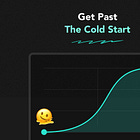Your Perfectionism is Lying to You
Unpacking the counterintuitive approach that actually drives creative success
Welcome to Unknown Arts, where we explore the creative power of art and technology. Ready to forge ahead into the unknown? Join the journey!
Your perfectionism is holding you back more than you realize.
I know, because I've been there.
Time and again, I'd envision something brilliant—a creation I knew would resonate if I could just bring it to life. But as soon as I'd start, that initial surge of energy would slam into the brick wall of reality.
The sheer amount of work would overwhelm me. My skills weren't up to the task of executing my vision yet. And with each attempt falling short, my energy and hope would drain away. I'd stare at the seemingly impossible gap between my ideal and what I could produce, and I’d feel defeated.
The nagging voice in my head would whisper, "If you can't make it perfect, why even bother?" And just like that, I'd be stuck—my longing for perfection blocking me from creating anything at all.
Perfectionism isn't the virtue we've been led to believe.
We're bombarded daily with images of supposed perfection online:
Instagram feeds curated to magazine standards
LinkedIn profiles that read like flawless resumes
YouTube videos polished to a cinema-level sheen
In this environment, it's no wonder we feel our work needs to be perfect just to have a chance. We start to believe that perfectionism isn't just helpful—it's essential.
But here's where we go wrong: we look at successful creatives and misattribute the source of their success. We see their attention to detail and strong work ethic, and we mistake these qualities for perfectionism.
This misconception can lead us to imposing paralyzing pressure on ourselves.
The truth is, perfectionism isn't the gift we thought it was. It's a curse in disguise, holding us back when we most need to move forward.
The costs of perfectionism are higher than you think
On the surface, the pursuit of perfection seems noble. But dig a little deeper, and you'll find the costs mount rapidly.
Perfectionism often sneaks in disguised as procrastination. You delay starting projects, fearing you can't produce work that's "good enough." Then, when you do begin, perfectionism morphs into an obsession with polishing what's already there.
Your completion rate and learning grind to a halt. You become so focused on refining one thing that you miss out on new experiences that lead to growth and skill development.
You become blind to a critical truth: In the realm of creativity, completion is currency.
If you want your work to get recognized, you need to finish first. You need to have work available for people to find.
As if these drawbacks weren’t enough to give you pause on their own, here's the real kicker...
Chasing perfectionism leads to imperfection.
The ultimate irony is this relentless pursuit of perfection often results in work that's far from perfect.
Your obsession with minute details obscures the big picture. The time you pour into endless tweaks and adjustments yields less and less improvement. And in your quest for flawlessness, you overwork your ideas until they lose their original spark.
This means perfectionism not only blocks you from achieving your dreams indirectly (by slowing you down), but it actively degrades the quality of your current work.
So, what's the solution?
How can you break free from this perfectionist paralysis?
Shift your goal from perfect to prolific
Instead of endlessly polishing one idea, complete it and move on to the next. It's through these repeated cycles of creation that you truly build skill.
If you're fearing the idea of “done”, reframe it as "done for now." Release your work into the world and give it some time and space. You can always revisit it later, particularly in digital mediums.
As someone who's worn many creative hats, I've experienced this shift across disciplines. By embracing it, I've developed skills, built creative confidence, grown more resilient, and learned to create my own momentum.
The results? My output skyrocketed. My skills grew exponentially. And you know what? The quality of my work improved dramatically.
It’s not easy, but this mindset shift from perfect to prolific is the key to unlocking your best work and making your biggest impact.
Final Thoughts
I get it. The desire to create something great burns within you.
That existential drive for excellence? I feel it every single day.
But over time I’ve calmed my perfectionist tendency. I’m not trying to force out a singular great work. I’m trying to create the conditions where greatness can emerge naturally.
I’m not chiseling away a sculpture set in stone. I’m tending to a garden: planting many seeds, nurturing them, and trusting the growth process.
So here's your new mantra:
Create abundantly. Judge less harshly. Share more bravely.
Be prolific.
And remember, quantity often paves the path to quality.
Until next time,
Patrick
If you got a little value from this post, consider subscribing or sharing. Follow me on X, Threads, or LinkedIn for more.






